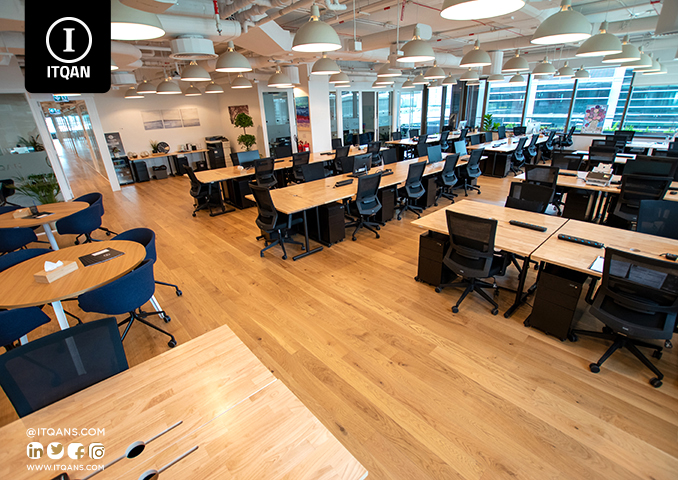Free zones are a haven for investors seeking to establish their businesses quickly and efficiently. Ajman Free Zone is emerging as one of the preferred destinations for companies looking for a favorable investment environment and multiple growth opportunities. Thanks to its close cooperation with Itqan Company, Ajman Free Zone provides exceptional services aimed at facilitating all aspects of the process of establishing and operating companies.
In this article, we will explore the basic steps for establishing a company in the Ajman Free Zone, as well as the benefits that this zone offers to investors. We will take a look at the cooperation with Itqan Company and its role in supporting startups and enhancing the economic infrastructure in the region.

جدول المحتوى
ToggleSteps to establish a company in Ajman Free Zone
Here are general steps for establishing a company in the Ajman Free Zone:
- Feasibility study: Before starting any procedures, conduct a detailed feasibility study of your project to determine the appropriate type of business activity and evaluate its chances of success in the Ajman Free Zone.
- Choose the legal type of company: Select the company legal structure that best suits your needs, such as limited company, joint stock company or sole proprietorship, according to local legislation and regulations.
- Determine the commercial activity: Determine the scope and type of commercial activity that you intend to practice in the Ajman Free Zone, and ensure that it is compatible with the laws of the emirate.
- Choosing a company name: Choose an appropriate name for your company and ensure that it is not similar to existing company names and that it complies with local company registration regulations.
- Submitting an application for incorporation: Submit an application for incorporation of the company to the competent authorities in the Ajman Free Zone, attaching all required documents, such as contracts, identity cards, and details of shareholders and directors.
- Obtaining the necessary licenses: Once your application is approved, obtain the necessary licenses to conduct business activity in the free zone, such as a company license and professional licenses as needed.
- Opening a bank account: Open a bank account for the company in one of the approved banks, and submit the necessary documents to activate the account and begin managing the company’s financial matters.
- Health and social insurance: Make sure to register with the relevant government agencies to ensure compliance with health and social insurance for employees, if the need is urgent.
- Legal and Tax Compliance: Ensure full compliance with all applicable legal and tax laws and regulations in the Ajman Free Zone and in the UAE in general.
Costs of establishing a company in Ajman Free Zone
The costs of establishing a company in the Ajman Free Zone vary depending on the type of company and the chosen scope of business, and usually include the following elements:
- Establishment and registration fees: These fees include the costs of obtaining the necessary licenses from the Emirate Authority, in addition to company registration fees and the contracts necessary to establish the company.
- Rental costs: The investor must pay rental costs for offices or commercial spaces in the Ajman Free Zone, and these costs vary according to location and size.
- Infrastructure costs: These may include infrastructure costs required to operate a business, such as technology, equipment and furniture, and are dependent on the type of business.
- Labor and staffing costs: These costs include employee wages and fringe benefits, in addition to costs associated with hiring the necessary administrative and technical personnel.
- Legal and consulting costs: These can include legal and accounting consulting costs to ensure compliance with local laws and regulations, and provide professional advice for efficient operations.
- General administrative costs: These costs include all other administrative expenses such as marketing, advertising, publicity, office supplies costs and other administrative activities.
- Insurance and taxes: These costs include health and social insurance for employees, in addition to compliance with local taxes and tax laws in the emirate.
Documents to establish a company in the free zone
To establish a company in a free zone such as Ajman Free Zone, the following documents are usually required:
- Registration application form: This form contains the required company information such as the company name, type of business activity, shareholder data, and legal directors.
- Memorandum of Association: This document details the company’s organizational structure, the rights and duties of shareholders, and the scope of the company’s activities.
- Power of Attorney form: If there is a need to authorize a third person to manage incorporation operations on behalf of shareholders or managers.
- Board Resolution Form: To appoint directors and determine their powers and responsibilities.
- Business Plan: A document detailing the business objectives, financing plans, and financial projections of the company.
- Certificates of partners and directors: copies of passports and educational certificates if required to meet legal requirements.
- Good Standing Certificate: for partners and managers proving that there are no legal or financial problems with the local authorities.
- Investment Application Form: It details the amounts invested in the company and details of the required financial deposits.
The tax and financial benefits of establishing a company in a free zone
Establishing a company in a free zone can provide a number of tax and financial benefits, some of which include:
- Tax exemptions: In many free zones, companies are exempt from income taxes for specific periods of time, which contributes to increasing net profits and enhancing competitiveness.
- Not imposing taxes on capital and profits: Freedom zones in many countries provide exemption from capital and profits taxes, which reduces the financial burden on startups and enhances their ability to grow and invest.
- Facilitated customs policies: Freedom Zones provide facilitated customs policies that allow import and export at low costs, which reduces operating costs and increases production efficiency.
- Simple procedures for incorporation: Freedom Zones provide simple and easy incorporation procedures, which reduces administrative and procedural costs for new companies.
- Flexible legislation and a stimulating business environment: Freedom Zones have flexible legislation that supports a stimulating business environment, which makes it easier for companies to achieve their business goals more effectively.
- Access to regional and international markets: Many free zones are located in strategic locations that make it easier for companies to better access multiple markets, which enhances opportunities for growth and expansion.
- Advanced infrastructure: Al-Hurriya areas provide advanced infrastructure that includes communications, transportation, and logistics services, which makes it easier for companies to carry out their operations with high efficiency.
Licenses necessary to establish a company in the free zone
To establish a company in a free zone, the following licenses are usually required:
- Business activity license: This license includes the approval of the company’s chosen activity, such as manufacturing, logistics, or financial services. It must be carefully selected to comply with local conditions.
- Building permit (if needed): In case the company needs manufacturing, warehouse or office space.
- Environmental and Health License: To ensure that the company adheres to all environmental and health regulations during its operations.
- Construction license (if needed): For companies that need specific infrastructure for their activities such as manufacturing industries.
- Tourism and Hospitality Licenses (if needed): Businesses operating in the tourism and hospitality sector need special licenses to ensure compliance with local tourism standards.
- Infrastructure and Energy License: If the company needs stable and safe access to infrastructure such as energy and water.
At the conclusion of this article, establishing a company in the Ajman Free Zone in cooperation with Itqan Company represents a strategic and important step for investors seeking to benefit from the unique advantages offered by this advanced economic entity. It allows companies to access a diverse and global market, and is characterized by advanced infrastructure and flexible investment policies.
The Ajman Free Zone provides a business-friendly environment that combines flexible legislation and simple establishment procedures, facilitating the start-up and operation process for new and medium-sized companies. In addition, it offers many economic incentives, such as not imposing taxes on profits and facilitating export and import, which enhances the region’s attractiveness to investors.
Through its partnership with Itqan, Ajman Free Zone allows companies to benefit from deep local expertise and specialized business management support, contributing to long-term business growth and sustainability. Thanks to this partnership, investors can achieve their business goals efficiently and successfully.
The most important frequently asked questions about establishing a company in the Ajman Free Zone
What types of companies can be established in the Ajman Free Zone?
A variety of companies can be established in Ajman Free Zone, including limited liability companies, sole proprietorships, personal companies, and subsidiaries of foreign companies.
Can foreigners obtain full ownership of the company in the Ajman Free Zone?
Yes, foreigners can obtain full ownership of the company in the Ajman Free Zone, in accordance with local legislation and laws.
What are the expected costs of establishing and operating a company in the Ajman Free Zone?
Costs vary based on the type of company and activity, and include registration fees, rental costs, licensing fees, and other administrative and operational costs.
What are the conditions necessary to obtain a license for the company in the Ajman Free Zone?
Basic requirements include obtaining site approval and a lease or proof of ownership, submitting a detailed business plan, and complying with all local laws and legislation.
What are the additional advantages of establishing a company in the Ajman Free Zone in cooperation with a local company such as Itqan?
Companies can benefit from specialized local advisory and administrative support, and access a network of local and international relationships to facilitate business and expand commercial scope.
What are the potential challenges that can be faced when establishing a company in the Ajman Free Zone?
Challenges faced by new businesses in Ajman Free Zone may include competing in a global market, complying with local and international legislation, controlling expenses and managing risks effectively.
















